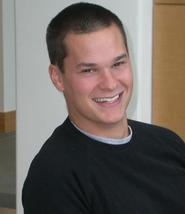
Abraham Lincoln is one of this country's most popular presidents, standing out in the middle of the nineteenth century – not a good period for memorable presidents, said Jerome Noel '09 (Carmel, Ind.), who has a Levitt Fellowship this summer to research Lincoln's rhetoric. The history major hopes to prove that it was Lincoln's extraordinary gift with words which made our 16th president one of our most famous.
Noel's research is a detailed textual analysis of Lincoln as a politician and speaker. Noel hopes to use Lincoln's own words, as well as numerous critical sources, to show how Lincoln changed the presidency through his words and actions. Noel will also examine the body of Lincoln's work from a temporal point of view to investigate how the 16th president's own views and abilities changed over his time in office – a difficult goal in light of Lincoln's famed privacy.
"I want to really understand the depth and approach [of Lincoln's speeches]," Noel explained. "How they were crafted for context." He told some of the stories about Lincoln and his composing habits, such as the president's penchant for noting phrases and storing them in his iconic hat, then sorting the slips of paper when he needed to write a speech. "We never think about presidents doing that now," Noel said. "We don't even think about presidents writing their own speeches."
Noel also emphasized the different in political rhetoric between the 1860's and today. "Now it's all soundbites," Noel said and compared chatty modern politicians to Lincoln, who refused to give impromptu speeches. To analyze Lincoln's work, then, it is essential that the reader "look at the whole speech the way it was meant to be read," all of it instead of the clips. For Noel, the opportunity to read one speech for all possible shades of meaning is one of the most fascinating parts of his research.
A first-time researcher, Noel enjoys his work, although the amount of reading can be a little daunting even for an experienced history major. "It's an endless amount of words," said Noel. "There's a lot of reading." He smiled. "I guess it's good that I like it."
During the year Noel, a varsity rower, is a writer with the Spectator and The Continental magazine and is a member of the Hamilton Mock Trial team. His interest in Lincoln dates to before his enrollment at Hamilton when Noel read Jay Winik's April 1865: The Month that Saved America. "I loved that," he said. After several more academic encounters with Lincoln, Noel decided to make the president the study of a research grant. "I really wanted this opportunity" to do a Levitt Fellowship, Noel explained.
Noel's research this summer is funded by the Levitt Research Fellows Program, operated through the Arthur Levitt Public Affairs Center. The students spend the summer working intensively in collaboration with a faculty member on an issue related to public affairs; Noel is collaborating with Associate Professor of History Douglas Ambrose.
-- by Lisbeth Redfield
Noel's research is a detailed textual analysis of Lincoln as a politician and speaker. Noel hopes to use Lincoln's own words, as well as numerous critical sources, to show how Lincoln changed the presidency through his words and actions. Noel will also examine the body of Lincoln's work from a temporal point of view to investigate how the 16th president's own views and abilities changed over his time in office – a difficult goal in light of Lincoln's famed privacy.
"I want to really understand the depth and approach [of Lincoln's speeches]," Noel explained. "How they were crafted for context." He told some of the stories about Lincoln and his composing habits, such as the president's penchant for noting phrases and storing them in his iconic hat, then sorting the slips of paper when he needed to write a speech. "We never think about presidents doing that now," Noel said. "We don't even think about presidents writing their own speeches."
Noel also emphasized the different in political rhetoric between the 1860's and today. "Now it's all soundbites," Noel said and compared chatty modern politicians to Lincoln, who refused to give impromptu speeches. To analyze Lincoln's work, then, it is essential that the reader "look at the whole speech the way it was meant to be read," all of it instead of the clips. For Noel, the opportunity to read one speech for all possible shades of meaning is one of the most fascinating parts of his research.
A first-time researcher, Noel enjoys his work, although the amount of reading can be a little daunting even for an experienced history major. "It's an endless amount of words," said Noel. "There's a lot of reading." He smiled. "I guess it's good that I like it."
During the year Noel, a varsity rower, is a writer with the Spectator and The Continental magazine and is a member of the Hamilton Mock Trial team. His interest in Lincoln dates to before his enrollment at Hamilton when Noel read Jay Winik's April 1865: The Month that Saved America. "I loved that," he said. After several more academic encounters with Lincoln, Noel decided to make the president the study of a research grant. "I really wanted this opportunity" to do a Levitt Fellowship, Noel explained.
Noel's research this summer is funded by the Levitt Research Fellows Program, operated through the Arthur Levitt Public Affairs Center. The students spend the summer working intensively in collaboration with a faculty member on an issue related to public affairs; Noel is collaborating with Associate Professor of History Douglas Ambrose.
-- by Lisbeth Redfield
